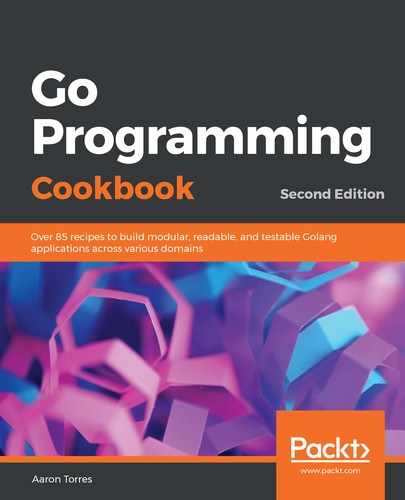These steps cover the writing and running of your application:
- From your Terminal/console application, create a new directory called ~/projects/go-programming-cookbook/chapter4/structured and navigate to this directory.
- Run the following command:
$ go mod init github.com/PacktPublishing/Go-Programming-Cookbook-Second-Edition/chapter4/structured
You should see a file called go.mod that contains the following:
module github.com/PacktPublishing/Go-Programming-Cookbook-Second-Edition/chapter4/structured
- Copy tests from ~/projects/go-programming-cookbook-original/chapter4/structured, or use this as an exercise to write some of your own code!
- Create a file called logrus.go with the following content:
package structured
import "github.com/sirupsen/logrus"
// Hook will implement the logrus
// hook interface
type Hook struct {
id string
}
// Fire will trigger whenever you log
func (hook *Hook) Fire(entry *logrus.Entry) error {
entry.Data["id"] = hook.id
return nil
}
// Levels is what levels this hook will fire on
func (hook *Hook) Levels() []logrus.Level {
return logrus.AllLevels
}
// Logrus demonstrates some basic logrus functionality
func Logrus() {
// we're emitting in json format
logrus.SetFormatter(&logrus.TextFormatter{})
logrus.SetLevel(logrus.InfoLevel)
logrus.AddHook(&Hook{"123"})
fields := logrus.Fields{}
fields["success"] = true
fields["complex_struct"] = struct {
Event string
When string
}{"Something happened", "Just now"}
x := logrus.WithFields(fields)
x.Warn("warning!")
x.Error("error!")
}
- Create a file called apex.go with the following content:
package structured
import (
"errors"
"os"
"github.com/apex/log"
"github.com/apex/log/handlers/text"
)
// ThrowError throws an error that we'll trace
func ThrowError() error {
err := errors.New("a crazy failure")
log.WithField("id", "123").Trace("ThrowError").Stop(&err)
return err
}
// CustomHandler splits to two streams
type CustomHandler struct {
id string
handler log.Handler
}
// HandleLog adds a hook and does the emitting
func (h *CustomHandler) HandleLog(e *log.Entry) error {
e.WithField("id", h.id)
return h.handler.HandleLog(e)
}
// Apex has a number of useful tricks
func Apex() {
log.SetHandler(&CustomHandler{"123", text.New(os.Stdout)})
err := ThrowError()
//With error convenience function
log.WithError(err).Error("an error occurred")
}
- Create a new directory named example and navigate to it.
- Create a main.go file with the following content:
package main
import (
"fmt"
"github.com/PacktPublishing/
Go-Programming-Cookbook-Second-Edition/
chapter4/structured"
)
func main() {
fmt.Println("Logrus:")
structured.Logrus()
fmt.Println()
fmt.Println("Apex:")
structured.Apex()
}
- Run go run main.go.
- You may also run the following commands:
$ go build
$ ./example
You should now see the following output:
$ go run main.go
Logrus:
WARN[0000] warning! complex_struct={Something happened Just now}
id=123 success=true
ERRO[0000] error! complex_struct={Something happened Just now}
id=123 success=true
Apex:
INFO[0000] ThrowError id=123
ERROR[0000] ThrowError duration=133ns error=a crazy failure
id=123
ERROR[0000] an error occurred error=a crazy failure
- The go.mod file should be updated and the go.sum file should now be present in the top-level recipe directory.
- If you copied or wrote your own tests, then go up one directory and run go test. Ensure that all the tests pass.
